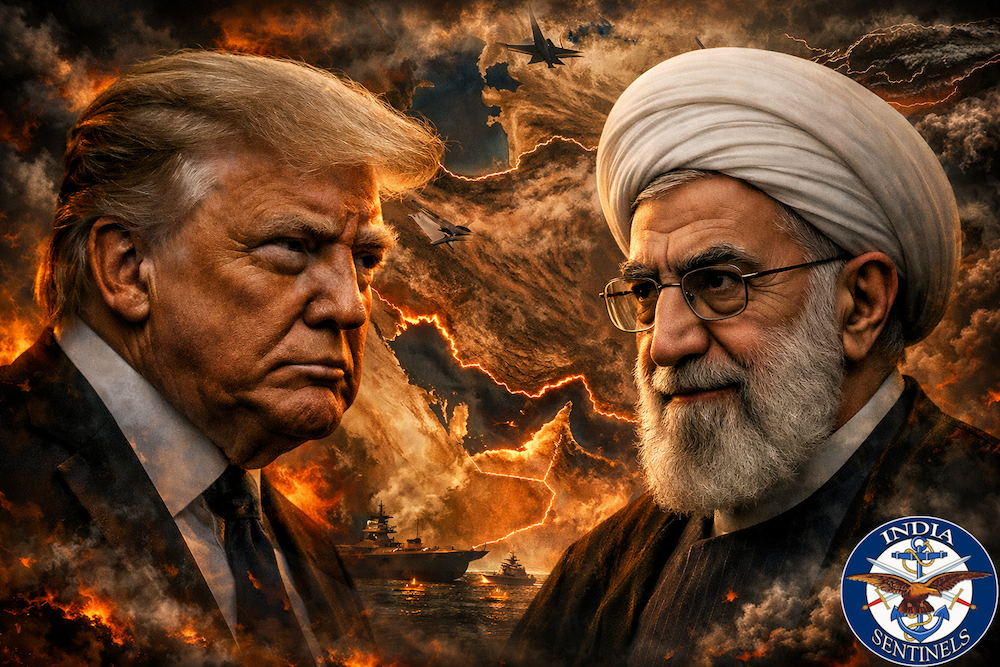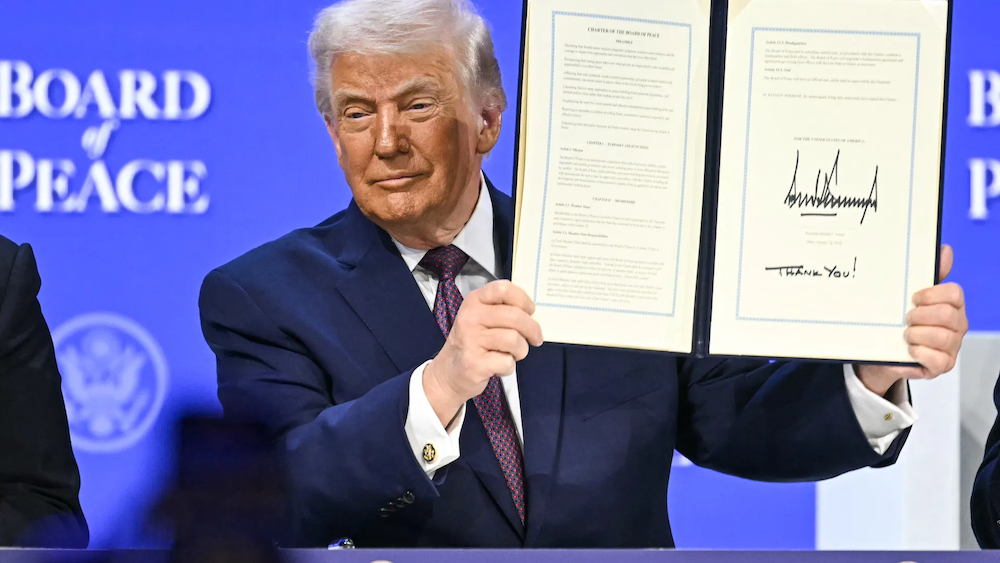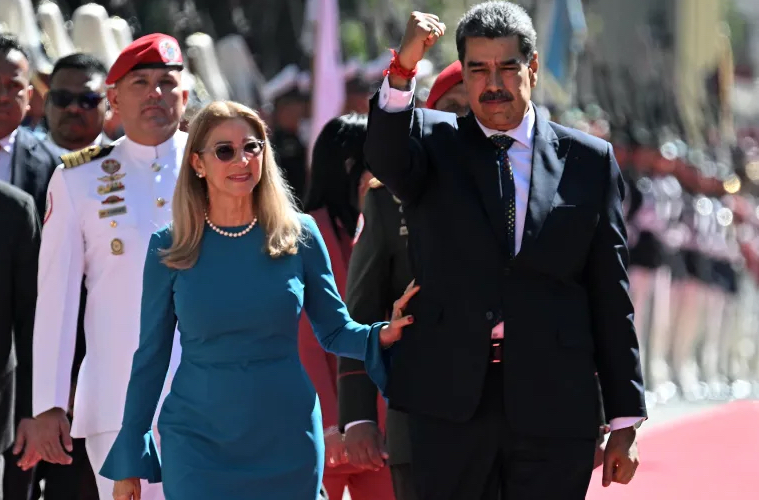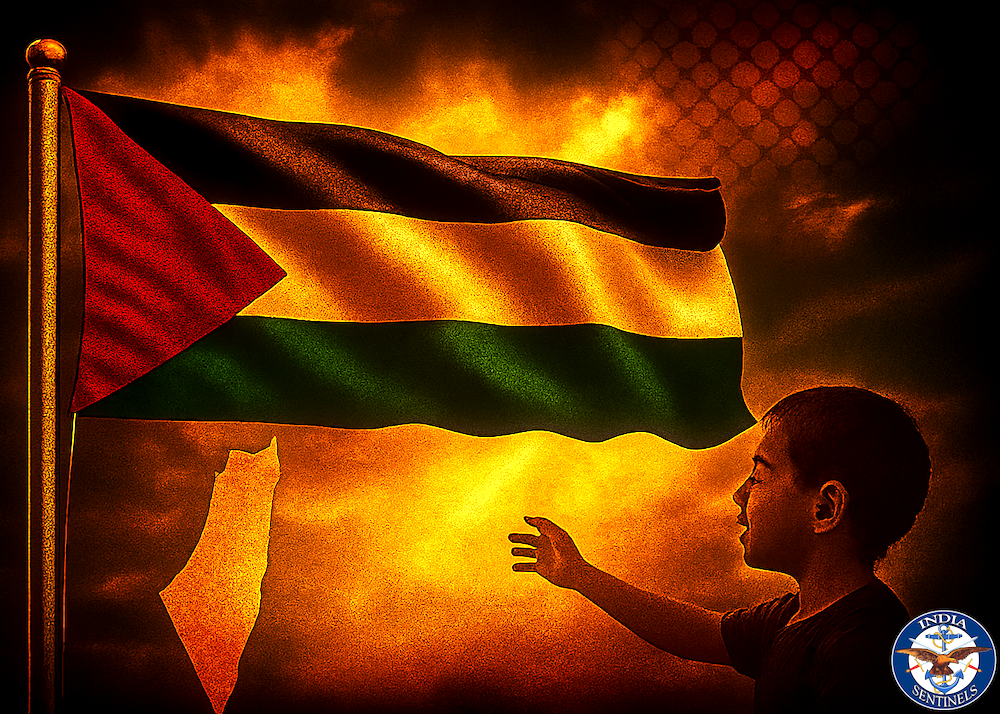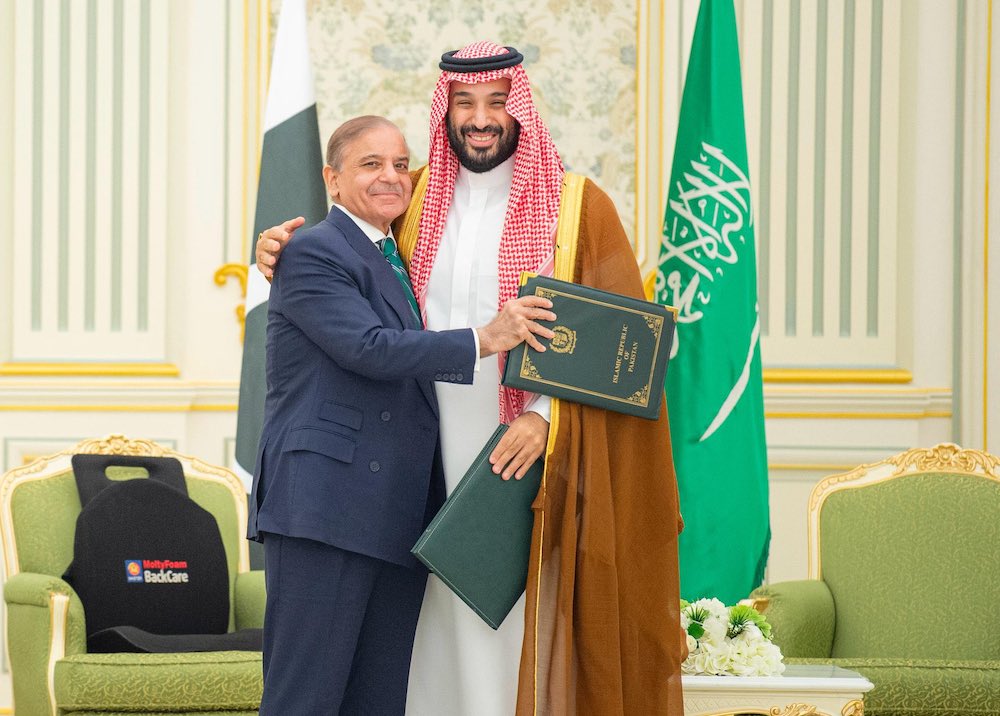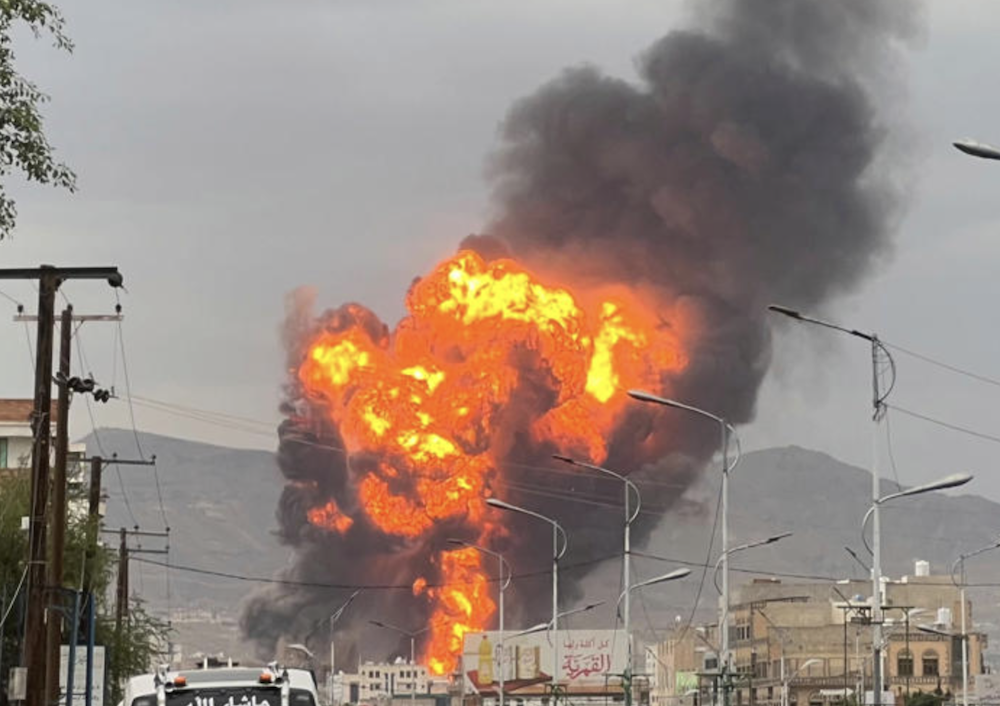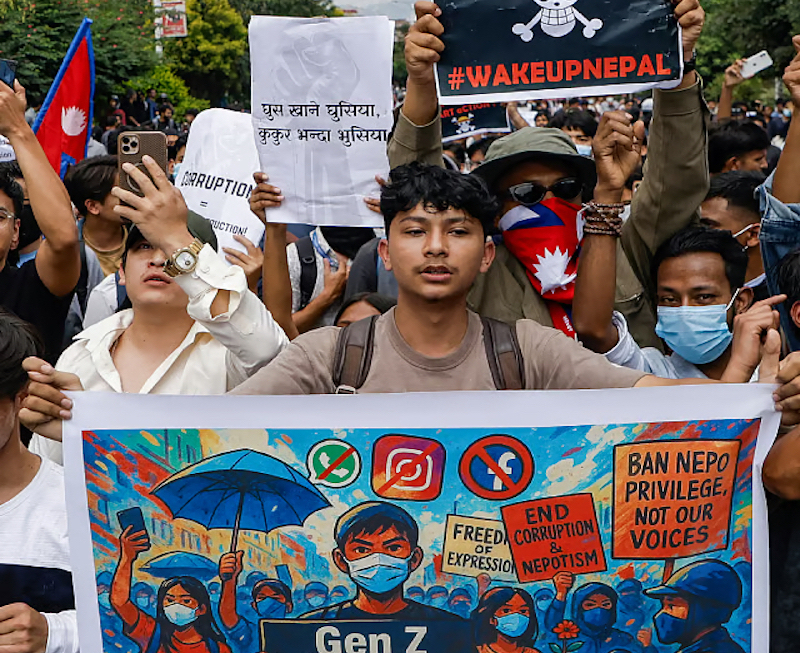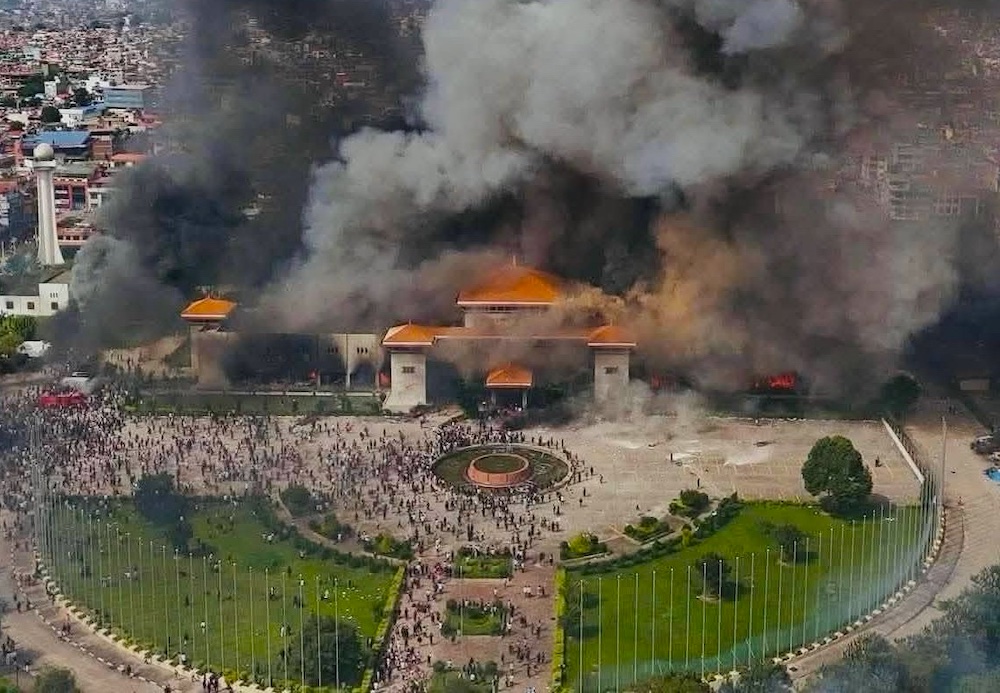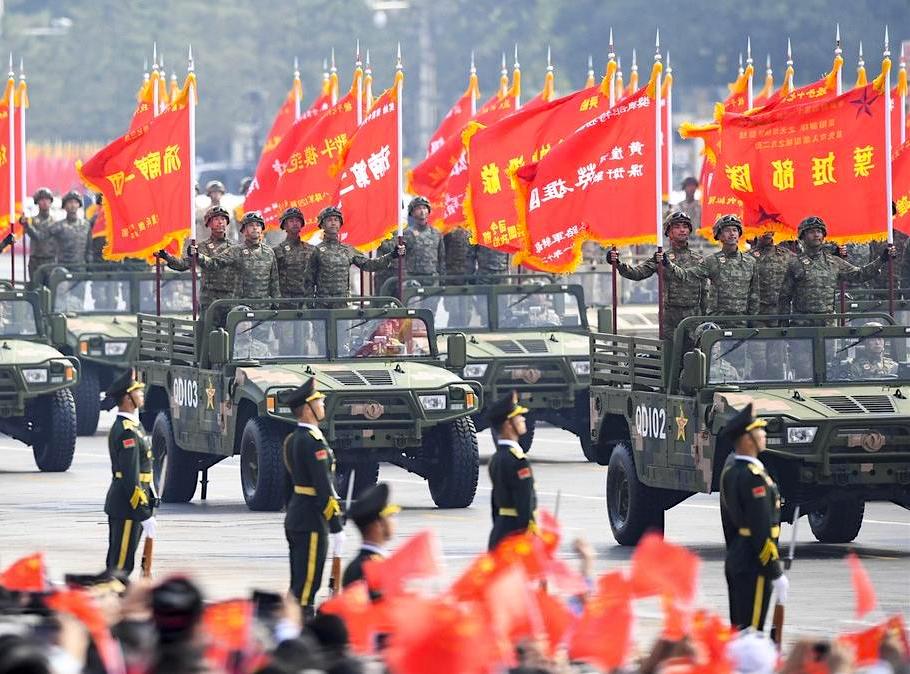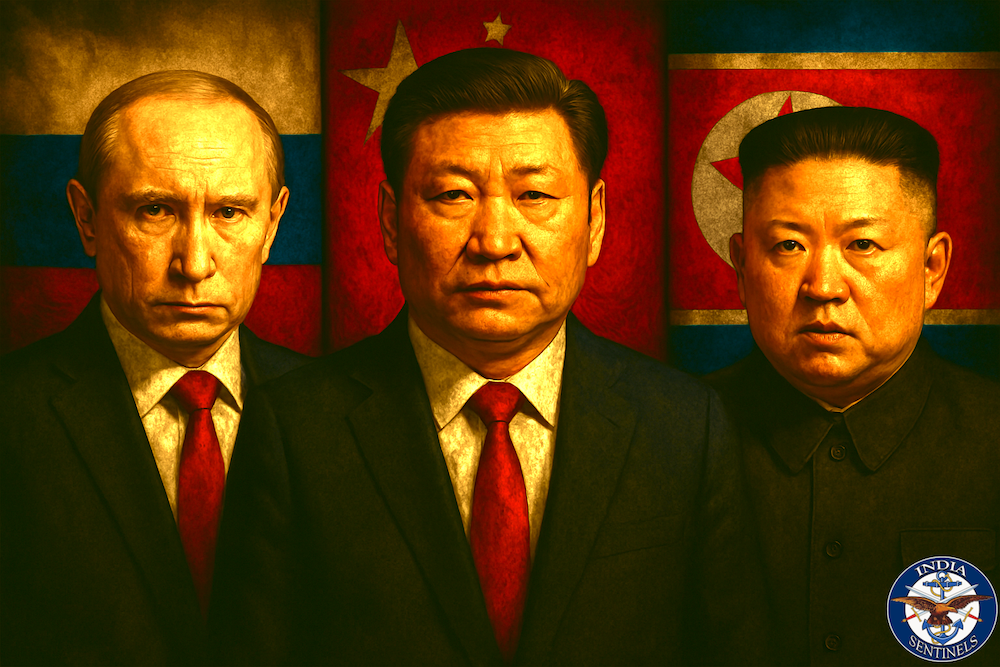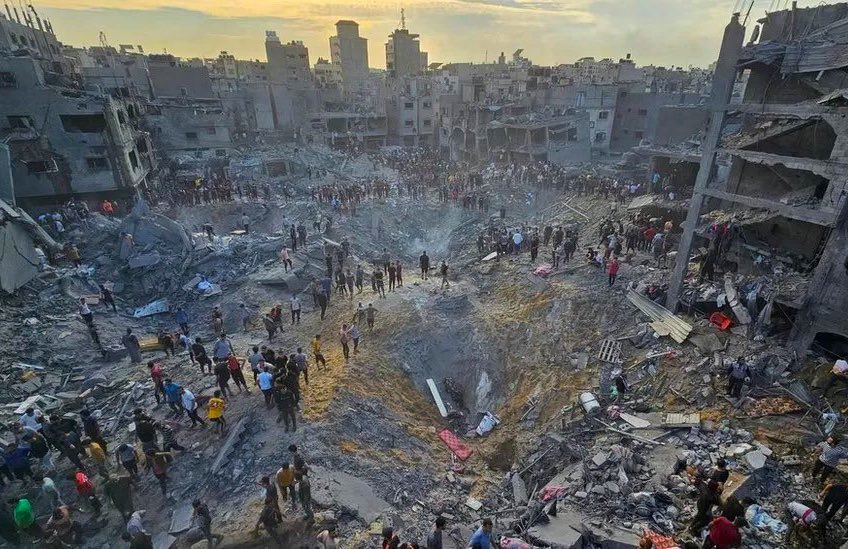 A crater is seen around the destruction in the Jabalya refugee camp in Gaza. Israel destroyed over three-fifths of all Gaza buildings since October 7, 2023. (Photo: X/@ApsanaBegumMP)
A crater is seen around the destruction in the Jabalya refugee camp in Gaza. Israel destroyed over three-fifths of all Gaza buildings since October 7, 2023. (Photo: X/@ApsanaBegumMP)
New Delhi: Israel and Hamas have reached a historic ceasefire agreement, on Wednesday, marking the culmination of three days of intensive indirect negotiations in Egypt’s Sharm el-Sheikh. The deal represents the first phase of the 20-point peace plan presented by the United States president, Donald Trump, which is aimed at ending a two-year conflict that has claimed over 68,000 lives and completely altered global perceptions of the Israeli-Palestinian conflict.
The agreement emerged from talks mediated by delegations from the US, Qatar, Turkey, and Egypt. Steve Witkoff, Trump’s Middle East envoy, led the American contingent alongside Jared Kushner, the president’s son-in-law, whose presence the Egyptian president, Abdel Fattah el-Sisi, described as “very encouraging”. Israeli and Hamas representatives negotiated through intermediaries rather than directly.
The Terms
Under the agreement’s first phase, Hamas must release 20 Israeli hostages believed alive, along with the remains of 28 others. In exchange, Israel will free over 1,000 Palestinian detainees, including 737 serving life sentences and 1,700 Gazans arrested since October 7, 2023. The ceasefire takes effect within 24 hours of Israeli cabinet ratification, followed by a 72-hour window for hostage releases.
Israeli forces will withdraw to a pre-agreed “yellow line”, which will allow 400 aid trucks daily into Gaza during the first five days, with gradual increases thereafter. Palestinian civilians may return to their homes, and Israel will suspend military flights over the territory for 10 to 12 hours daily.
A contentious exclusion has already sparked controversy. Israel refused to include Marwan Barghouti, who is serving five life sentences and considered the most popular Palestinian political figure, despite Hamas’s strong demands. The office of the Israeli prime minister, Benjamin Netanyahu, reportedly removed Barghouti from the prisoner list unilaterally at the last minute, along with other high-profile prisoners, including Ahmed Saadat and Hassan Salama.
Implementation Obstacles
The agreement faces substantial hurdles. Hamas must disarm and relinquish governance of Gaza – conditions it has historically resisted. The plan envisions Hamas being replaced by a “technocratic, apolitical Palestinian committee” overseen by a “board of peace” chaired by Trump, with former British prime minister Tony Blair in a leadership role. This unprecedented international intervention in Palestinian governance has already drawn scepticism from analysts who question Hamas’s willingness to cede control.
Israel’s commitment to the withdrawal timeline remains equally uncertain. The agreement requires Israel to maintain control over only a portion of Gaza, a significant shift from its current occupation of most of the territory. Hardline elements within Netanyahu’s coalition, including national security minister Itamar Ben-Gvir, have already voiced opposition to substantial concessions.
Previous ceasefire attempts collapsed over precisely such disagreements. The January 2025 ceasefire lasted only two months before Israeli military operations resumed, demonstrating the fragility of such agreements without robust enforcement mechanisms.
The Human Toll
The two-year conflict has exacted a catastrophic toll on Palestinians in Gaza. Over 67,000 Palestinians have been killed according to the Gaza health ministry, figures the United Nations and other world bodies consider credible. Among the deceased, approximately 18,500 were children – 31 per cent of total casualties. The conflict has displaced over 90 per cent of Gaza’s 2.2 million residents, with entire neighbourhoods reduced to rubble.
However, these numbers don’t account for those tens of thousands of Gazans who are still buried under the rubble of collapsed buildings or those who died as indirect consequences of the war. Several credible studies have shown that the number of Palestinians killed in Gaza after October 7, 2023, to be in hundreds of thousands.
Satellite analysis revealed that three-fifths of all buildings in Gaza – 191,263 structures – have been damaged or destroyed. The healthcare system has collapsed, with 70 per cent of medical facilities destroyed. Educational infrastructure has been similarly devastated, with 87 per cent of school buildings damaged. The UN has declared Gaza to be experiencing catastrophic food insecurity, with 80 per cent of those suffering from famine globally being Palestinians in Gaza.
This is Gaza, before and after 7 October 2023.
— Middle East Eye (@MiddleEastEye) October 7, 2025
Satellite images captured by Planet Labs PBC cast light on the scale of destruction caused by Israel’s assault on the besieged enclave over the last two years.
In a statement on Monday, Gaza’s media office said that 90% of Gaza has… pic.twitter.com/ctzKMpQE70
On the Israeli side, the October 7, 2023 Hamas attack resulted in 1,175 deaths, including 695 Israeli civilians, 71 foreign nationals, and 373 security forces personnel. The casualties included 36 children, with the youngest victim being a 10-month-old baby. Additionally, 251 individuals were taken hostage to Gaza.
The subsequent military campaign has cost Israel dearly in military personnel. As of August 2025, nearly 900 Israel Defence Forces soldiers have been killed since October 7, including 311 on the first day and 589 in subsequent operations. The Golani Brigade suffered the highest losses with 114 deaths, followed by the Combat Engineering Corps with 79 fatalities. A total of 6,213 soldiers have been wounded, with 925 seriously injured.
The conflict’s impact extended beyond Gaza and Israel. In the West Bank, 996 Palestinians have been killed since October 7, including 212 children – representing a 25 per cent increase above expected levels.
Israeli ‘War Crimes’
Multiple international bodies and human rights organizations have documented evidence of potential war crimes by Israeli forces. A UN Independent International Commission of Inquiry report concluded in September that Israel committed “genocide” in Gaza, finding evidence of four of the five genocidal acts defined under international law: killing group members, inflicting serious bodily and psychological harm, creating conditions aimed at the group’s destruction, and obstructing births.
The International Criminal Court issued arrest warrants for war crimes against Netanyahu and his former defence minister. Israeli human rights organizations B’Tselem and Physicians for Human Rights Israel became the first Israeli organizations to conclude that Israel was committing genocide against Palestinians in Gaza.
The allegations include systematic starvation of Gaza’s civilian population, failure to protect civilians during military operations leading to tens of thousands of innocent deaths, and indiscriminate destruction of entire towns. The International Commission of Jurists condemned Israel’s “continuous forcible displacement of Palestinians and direct attacks against civilians in internally displaced persons’ camps and humanitarian aid distribution sites”.
Hamas’s October 7 attack also constituted serious violations of international humanitarian law. The assault involved deliberate targeting of civilians, taking of hostages, and allegations of torture and sexual violence. The attack was described as the deadliest day for Jews since the Holocaust, with militants massacring civilians in kibbutzim and at a music festival.
Global Perception Shift
The Gaza conflict has radically altered international perceptions of Israel and produced consequences that extend far beyond diplomatic relations. What began with widespread western sympathy for Israel following the October 7 attacks has evolved into something unprecedented: a global reckoning with Israel’s conduct that has fractured decades-old alliances and damaged the moral authority Israel long derived from Holocaust memory.
The transformation has been particularly stark in western nations traditionally aligned with Israel. On July 21, ministers from the UK, European Union, Canada, Australia, New Zealand, and Japan issued a joint statement condemning Israel’s conduct using unusually strong language.
The statement declared that “the suffering of civilians in Gaza has reached unprecedented levels” and criticized Israel’s aid distribution system as “dangerous, fuels instability, and deprives Palestinians of dignity”. The ministers condemned “the piecemeal distribution of aid and the inhumane killings of civilians, including children, who are trying to meet their most basic needs for water and food”.
Germany’s shift has been especially significant. Traditionally Israel’s staunchest European ally, Germany has witnessed a dramatic change in public sentiment. A YouGov poll in September showed that 62 per cent of Germans believed Israel was committing genocide in Gaza, including 60 per cent of conservative Christian Democratic Union voters. The German foreign minister, Johann Wadephul, described Gaza as “hell on earth” during his UN general assembly speech, marking a notable departure from Germany’s historically unwavering support for Israeli policies.
The European Union launched a review of diplomatic and trade ties with Israel, with an internal report finding indications that Israel violated human rights obligations under the EU-Israel Association Agreement. However, meaningful sanctions have remained limited, with critics arguing the EU lacks political courage to leverage its position as Israel’s biggest trading partner.
The US maintained strong support for Israel throughout the conflict while simultaneously pressuring for a ceasefire. The previous administration of Joe Biden initially backed Israel’s right to self-defence but grew increasingly concerned about civilian casualties and humanitarian conditions. Trump’s election victory in 2024 brought renewed diplomatic energy to peace efforts, with his administration threatening “all hell” if Hamas rejected the peace proposal.
Yet even American public opinion has shifted dramatically. Universities across the US witnessed unprecedented protests against Israeli actions, with student encampments and demands for institutional divestment from companies doing business with Israel. The generational divide in American attitudes toward Israel has widened considerably, with younger Americans – including young Jewish Americans – expressing far more critical views of Israeli policies than their elders.
The conflict has exposed deep fissures within Jewish communities worldwide. Progressive Jewish organizations have found themselves at odds with establishment Jewish institutions over Israel’s conduct in Gaza. Groups like Jewish Voice for Peace and IfNotNow have organized protests against Israeli military operations, while traditional Jewish organizations like the Anti-Defamation League have struggled to reconcile criticism of Israeli government actions with concerns about rising antisemitism.
This internal debate has created a crisis of identity for many diaspora Jews who have historically viewed support for Israel as integral to their Jewish identity. The spectacle of Israeli forces demolishing entire neighbourhoods in Gaza, combined with statements from Israeli officials that critics have characterized as genocidal rhetoric, has forced uncomfortable conversations within Jewish communities about the relationship between Jewish values and Israeli state actions.
Holocaust Memory and Antisemitism
The Holocaust’s moral authority – long a cornerstone of Israel’s international legitimacy – has been significantly eroded by the Gaza conflict. Critics have pointed to the bitter irony of a state founded in the aftermath of genocide standing accused of perpetrating one itself. While such comparisons remain deeply controversial and painful for Holocaust survivors and their descendants, the frequency with which they appear in international discourse reflects how profoundly the Gaza conflict has damaged Israel’s moral standing.
Jewish communities worldwide have experienced a disturbing surge in antisemitic incidents, complicating efforts to distinguish between criticism of Israeli government policies and hatred of Jews. The FBI reported a significant increase in anti-Jewish hate crimes following October 7, 2023, with Jewish students on university campuses reporting harassment and threats.
Yet this rise in antisemitism has occurred alongside, and sometimes intertwined with, widespread criticism of Israel’s conduct – creating a toxic environment where legitimate political debate becomes conflated with bigotry.
The long-term consequences of this perception shift remain unclear, but the damage to Israel’s international standing appears substantial. The generation that witnessed the Holocaust firsthand is rapidly disappearing, and with it, the automatic sympathy that shaped western attitudes toward Israel for decades. For younger generations, the defining images of the Israeli-Palestinian conflict are no longer Holocaust survivors building a nation but rather Palestinian children pulled from rubble in Gaza.
This transformation has practical implications. International criminal court arrest warrants for Israeli leaders, boycott movements gaining traction in Western universities and civil society, and the erosion of bipartisan support for Israel in American politics all suggest that the Gaza conflict has marked a turning point in how the world views the Israeli-Palestinian struggle.
India’s Ambiguous Stance
India’s response to the Gaza conflict has exposed contradictions in its foreign policy that have damaged its credibility among global south nations. Once a stalwart supporter of Palestinian rights and a leader of the Non-Aligned Movement, New Delhi has maintained conspicuous silence on Israeli conduct in Gaza, even as it deepened military and economic ties with Israel.
The shift has not gone unnoticed. India abstained on a UN Human Rights Council resolution in April 2024 that called on Israel to implement an immediate ceasefire in Gaza and called on member states to impose an arms embargo on Israel. This abstention, along with similar abstentions on UN general assembly resolutions, has been interpreted by many in the global south as India prioritizing strategic partnerships with Israel and the US over its historical solidarity with Palestinians.
The perception has been reinforced by high-profile visits and agreements. In September, India signed an investment deal with Israel, welcoming the Israeli finance minister, Bezalel Smotrich, to New Delhi even as Gaza faced catastrophic humanitarian conditions. Smotrich is widely perceived to be a Zionist extremist around the world along with his ministerial colleague Ben-Gvir and face travel bans to several countries.
Indians constitute the largest group of foreign students in Israel, while Israeli construction companies have sought permission to hire up to 100,000 Indian workers – economic ties that have continued uninterrupted despite the conflict.
India’s official statements have been carefully calibrated to avoid offending either side. The government condemned the October 7 attacks and expressed concern about civilian casualties in Gaza, describing the humanitarian crisis as “simply unacceptable”. Yet these statements lacked the moral clarity that characterized India’s historical position on Palestinian rights, which has left many observers and rights groups disappointed.
The consequences for India’s standing in the global south have been significant. African nations, Arab states, and other developing countries that once looked to India for leadership on issues of decolonization and justice have questioned New Delhi’s commitment to these principles. At UN forums, India’s abstentions have placed it at odds with the overwhelming majority of global south nations that have consistently voted for ceasefire resolutions and humanitarian interventions.
The shift reflects broader changes in India’s foreign policy under Prime Minister Narendra Modi’s government, which has prioritized strategic partnerships with Israel and the US over traditional alignments with the Non-Aligned Movement. Yet this realpolitik approach has come at a cost. India’s aspirations to permanent membership on the UN security council and leadership of the global south have been severely undermined by perceptions that it has abandoned its principled positions when they conflict with strategic interests.
The irony is that India’s silence has not yielded obvious strategic benefits. Israel’s relations with Arab states continue to evolve independently of India’s position, while American support for India’s regional ambitions remains contingent on multiple factors beyond India’s stance on Gaza. Meanwhile, India has squandered moral capital accumulated over decades of championing developing world causes.
Pakistani and Chinese diplomats have seized the opportunity to criticize India’s selective application of principles, noting the contrast between India’s vocal positions on issues affecting its interests and its silence on Palestinian suffering. This criticism has resonated in forums where India competes for influence, from the Organization of Islamic Cooperation to the African Union.
The Gaza conflict has thus revealed limitations in India’s attempt to balance competing interests in its foreign policy. The cost has been measured not in immediate diplomatic setbacks but in the erosion of India’s reputation as a principled voice for the global south – a reputation that took generations to build and may take equally long to restore.
Regional Reactions
Arab states initially condemned Hamas’s October 7 attacks but grew increasingly critical of Israel’s response. Egypt, Jordan, Qatar, Saudi Arabia, the United Arab Emirates, Kuwait, and Bahrain held emergency meetings to coordinate responses and plan alternatives to western proposals. Arab League secretary-general Ahmed Aboul Gheit called the ceasefire deal “good news” for Gaza after two years of “bloodshed and widespread destruction”.
Turkey emerged as one of Israel’s harshest critics, with the country’s president, Recep Tayyip Erdoğan, openly supporting Hamas and condemning Israeli actions as genocide. Turkey suspended all trade with Israel and consistently advocated for international sanctions. However, Erdoğan allowed the flow of Azerbaijani oil to Israel through its territory, which continued to fuel Israel’s war machine.
Nonetheless, following the ceasefire announcement, Erdoğan expressed satisfaction with the negotiations and pledged Turkey would “closely monitor the meticulous implementation of the agreement”.
The African Union strongly condemned Israel’s actions in Gaza, with the group’s chair, Azali Assoumani, stating that Israel’s response to Hamas was “not proportionate”. The AU called for stronger diplomatic efforts toward a two-state solution and condemned actions targeting children. Hamas welcomed the AU’s condemnation and described African positions as “a natural extension of Africa’s history of struggle against colonialism and injustice”.
The 54 African countries constitute a significant voting bloc in international forums, with the overwhelming majority voting in favour of UN general assembly resolutions calling for humanitarian truces and ceasefires. Only Liberia among African nations failed to support UN resolutions related to Gaza.
Gaza Reconstruction
Reconstruction efforts will require massive international investment, with estimates exceeding $53 billion to rebuild Gaza, including $20 billion needed in the initial three years. The scale of destruction – with 191,263 buildings damaged or destroyed – presents logistical challenges that could take years to address.
The plan’s vision for post-conflict Gaza governance remains contentious. Hamas has historically rejected international oversight and Palestinian Authority control, while Israel opposes any continued Hamas influence. The proposed “board of peace” led by Trump and Blair represents an unprecedented international intervention in Palestinian governance, raising questions about Palestinian sovereignty and self-determination.
The agreement’s success depends on broader regional stability and the roles of key mediating countries. Egypt, Jordan, Qatar, and Turkey must maintain their commitment to implementation oversight while managing their own domestic and regional pressures. The exclusion of prominent Palestinian prisoners like Barghouti may undermine Palestinian public support for the agreement, potentially providing ammunition for spoilers who oppose the peace process.
Historical Significance
This ceasefire agreement represents the most comprehensive attempt to end the Israeli-Palestinian conflict since the Oslo Accords of the 1990s. Unlike previous agreements that focused primarily on temporary ceasefires, Trump’s 20-point plan addresses fundamental issues including governance, reconstruction, security arrangements, and pathways to Palestinian statehood.
The agreement comes at a critical juncture, with international support for Israeli policies at historic lows and growing global recognition of Palestinian rights. The timing, coinciding with the second anniversary of the October 7 attacks, provides symbolic significance for both sides to move beyond the cycle of violence.
Yet the fundamental issues that have sustained the conflict – competing national narratives, territorial disputes, and security concerns – remain largely unresolved. The agreement represents not an end to the Israeli-Palestinian conflict but a crucial first step toward sustainable peace. Its success will depend on the commitment of all parties to move beyond the cycles of violence that have defined this conflict for generations, backed by sustained international support and oversight.
The human cost of the conflict underscores the urgency of successful implementation. Whether this moment of diplomatic breakthrough can be transformed into lasting peace and justice for both Palestinians and Israelis will be determined in the coming months as the parties navigate the treacherous path from agreement to implementation.
The international community’s evolving position on the conflict, with growing criticism of Israeli actions and support for Palestinian rights, provides both opportunity and pressure for meaningful change. The question now is whether political will exists to transform this fragile ceasefire into a sustainable peace that addresses the legitimate aspirations and security concerns of both peoples.
Note: The analysis in this article based on documents provided and publicly available information as of October 9, 2025
Follow us on social media for quick updates, new photos, videos, and more.
X: https://twitter.com/indiasentinels
Facebook: https://facebook.com/indiasentinels
Instagram: https://instagram.com/indiasentinels
YouTube: https://youtube.com/indiasentinels
© India Sentinels 2025-26

